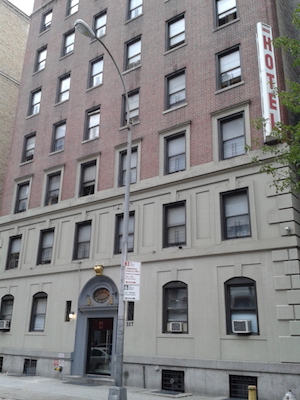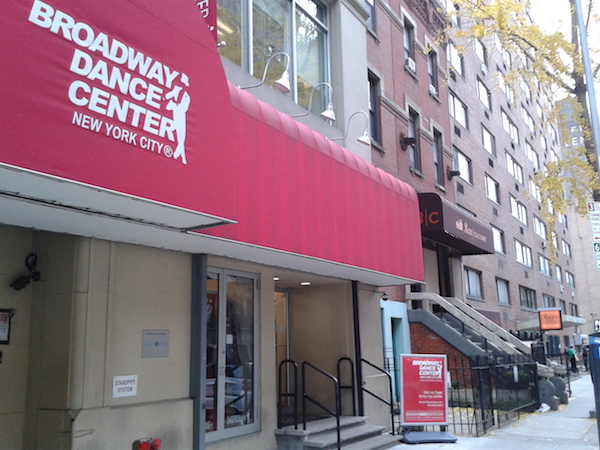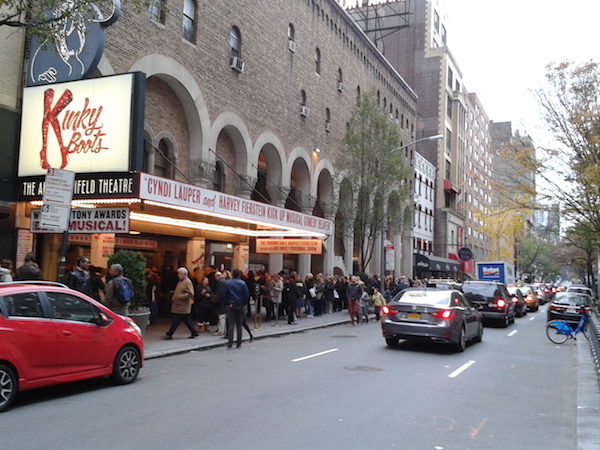BY WINNIE McCROY | When people think back to the “bad old days” of Times Square, they remember the sex shops, perverts and criminal elements that once dominated the landscape. These days, people are more likely to envision battling Elmos or the risqué “desnudas” that pose with tourists for money.

But the block of W. 45th St. between Eighth and Ninth Aves. is like a time warp that will shuttle you right back to the ’80s: criminals loiter on the street, drug dealers sling crack cocaine, and prostitutes have public sex. Neighbors say it’s all due to the presence of the Aladdin Hotel, a homeless shelter that opened in 2002.
“This neighborhood has suffered serious security and quality of life issues in and around the Aladdin since it opened,” said Timothy Tanner, Co-Chair of the West 45th Street Block Association.
“The Aladdin is a ‘Next Step’ shelter, which means that many, but not all, residents are people who have broken rules at other shelters and therefore need ‘enhanced supervision.’ The irony is that the Aladdin has a reputation within the shelter community as a place where ‘anything goes.’ I suppose that’s one way to deal with people who break rules — send them to a place where there’s no rules, or where the rules aren’t really enforced.”
The result has been quality of life disturbances that include breaking and entering, public urination, indecent exposure, street fights, drug dealing, open drug use, public sex acts, prostitution, violent crime, and the menacing of residents, business employees and pedestrians.
“All right here on a ‘quiet’ residential block in the theatre district. My wife and I are raising two small children on this block,” said Tanner. He said it’s not NIMBY-ism, explaining, “I have a brother who has been homeless for long periods, living on the streets or in shelters, so I see the issues from both sides.”
Residents of the block cross to the other side of the street to avoid walking under the Aladdin’s windows, because shelter residents frequently throw furniture, empty beer cans and even bags of urine out the windows.
A recent incident, says Tanner, involved “someone throwing something from a neighboring building. Two women from the Aladdin were having an argument, screaming at each other out on the sidewalk around midnight, loud enough that you could hear it up and down the block. It lasted about 20 minutes. At one point they were in front of the Whitby apartment building [325 W. 45th St.], and their security guard came out to see if he could put a lid on it [Aladdin security was nowhere in sight]. And a resident of the Whitby must have thrown water or something from an upper window to douse the disputants and it was the guard who ended up getting hit — he was looking up, trying to figure out where it came from.”
Drugs are also a perpetual problem at the Aladdin. Whenever the cops and DHS move out one set of problem residents, another set of problem residents gets moved in. And it’s not just neighbors who are suffering from lax security at the Aladdin. Shelter residents and the few remaining SRO (Single Room Occupancy) residents at the Aladdin bear the brunt of the problems, living in the middle of it all.
“I’ve had several shelter residents complain to me about poor living conditions and inadequate security inside the Aladdin,” said Tanner. “One told me he had trouble staying awake at his job because he couldn’t get a decent night’s sleep in the shelter because of people fighting, screaming ‘You smoked all my crack,’ domestic disturbances, loud music, etc.”
And the problems are always worse in the summer, he said. Spikes in temperature and humidity, combined with the lack of A/C and cramped conditions inside the Aladdin, force people outside to get relief from the heat. Because they have nowhere else to go, they congregate on the sidewalk outside — and that’s where problems often start.
“A few summers ago there was an organized drug ring operating out of the Aladdin,” said Tanner. “A supplier would roll up in a car and the dealers would come out of the Aladdin. There would be these subtle but at the same time obvious handoffs, then the dealers would go back in the shelter or hang out on the sidewalk making sales. There were 10, 12 people involved. Eventually the cops pushed the operation over to 11th Avenue.”
This summer was one of the worst in Tanner’s recent memory. He said he was personally menaced by people loitering outside the Aladdin several times as he was coming home late from work. He also said that he spoke with a watchman who told him that on the night of Tues., Aug. 18, from about 10 p.m. to 1 a.m., there was a large, unruly group gathered outside the Aladdin that was harassing pedestrians, chasing women down the sidewalk, drinking, and urinating on the sidewalk.
“The watchman said Aladdin security did nothing during this time and at some point a NYPD squad car rolled by and also did nothing. This led to a 1 a.m. fight in front of the Broadway Dance Center [322 W. 45th St.]. Their employees had to clean up a pool of blood on their front steps the next morning, just before a children’s dance class,” reported Tanner. “The next afternoon there was a street fight in front of the Aladdin. One combatant had a knife or box cutter and the other grabbed one of our ‘Do not litter’ signs from a tree bed and started swinging it. He got slashed, his torso cut open from waist to collarbone, and stumbled into a business on our block where he received life-saving first aid.”

Tanner also noted that there was a noticeable drop in policing this summer after the public spat between the mayor and the NYPD. Officers told him that the resources had been relocated away from the Times Square area. So the block association went to both Midtown North and Midtown South police precinct Community Council meetings to voice their concerns.
“To their credit, the commanding officers of both precincts immediately mobilized and dedicated resources to this block,” said Tanner. “We also helped organize a Community Action Board (CAB) specifically dedicated to Aladdin issues and have advocated over a period of years in that forum.”
The CAB meets every few months and is comprised of representatives from the Department of Homeless Services, representatives of various elected officials, the police, Community Board 4 (CB4), the Aladdin landlord and shelter services provider, and the West 45th Street Block Association, representing the community.
But Tanner said that several big problems remain, noting that a private security guard at the Aladdin admitted that there is a flourishing drug trade and rampant drug and alcohol use inside the facility, and that some of the security guards are partaking.
“I can’t say anymore that our advocacy is ‘tireless’ because we’re frankly tired of the CAB. We’re tired of discussing the same problems over and over, we’re tired of broken promises from the landlord. We’re tired of listening to city agencies defend and justify their failures over a period of years, and recently we’ve seen the PR forces at DHS [Department of Homeless Services] seize control and impose restrictions on the CAB forum in an effort to control and limit their media exposure,” said Tanner. “Rather than treat it as a PR problem, DHS could do something productive, deal with an actual problem, like maybe get the guards to stop drinking with residents out on the sidewalk.”
In the first few years after the shelter opened, said Tanner, there was a constant stream of sirens and lights flashing outside. More recently, there was a media furor over the woman who got slashed there in 2013, and the slashing outside the shelter this summer.
“Things improved over time, but then you have a summer like this last one and you wonder when is it ever going to end? I think the answer is ‘never.’ Not so long as landlords like Alan Lapes and the Podolskys, and shelter service providers like Aguila are allowed to operate shelters all over the city, with minimal supervision and accountability,” said Tanner.
He said that the problem is that the city needs shelter beds, to meet the law that ensures a bed to anyone who asks. There aren’t enough landlords willing to legally convert their buildings to shelter use. As Tanner quips, “New York City would do business with Satan if he could provide shelter beds.” But men like Lapes recognize that housing the homeless is hugely profitable. They warehouse people in small rooms that rent for more than $3,000 a month, and don’t worry about the fallout.
Joe Restuccia, Co-chair of the Housing Committee of CB4, said the main problem is that Aguila, who are former employees of the DHS, are for-profit housing providers who are not providing good services.
“We get it — the city is mandated under the law to provide shelter to the homeless, but not to provide for for-profits,” said Restuccia. “We need to get DHS to move ahead and get a solid not-for-profit in there to provide services, especially since Aguila doesn’t have a contract. So let’s go out there and see if we can get a good not-for-profit, because the Block Association is out of their mind over this, and rightly so.”
A spokesperson at DHS told Chelsea Now, “DHS works closely with NYPD to ensure the safety and security of our clients, staff, and the surrounding community, and when necessary, transfers clients to other facilities.”

But Tanner noted that the NYC Comptroller’s Office under John Liu audited Aguila in 2011 and found millions of dollars in unsupported, insufficiently supported and improper expenditures. The current Comptroller, Scott Stringer, refused to sign off on the Aladdin contract on May 11 of this year, citing a NYC Department of Investigations report highlighting deplorable conditions in our city shelters. As of November 13, the contract had not been resubmitted.
“With 57,000 people — including 23,000 children — sleeping in shelters, it’s undeniable that our city is in the midst of a homelessness crisis,” Stringer told Chelsea Now. “When my office returns a contract, it’s because it’s missing important information, or doesn’t meet the city’s own standards.”
City Councilmember Corey Johnson said he had real concerns about this shelter’s operator, Aguila, Inc. — not only over quality of life and public safety issues associated with the Aladdin Shelter, but the numerous Department of Buildings violations, and the fact that the shelter is still operating without a city contract.
“My staff has been working closely with other local elected officials and the community, organizing Community Advisory Board meetings with the Midtown North and South Precincts and the Department of Homeless Services,” said Johnson. “After years of delays we succeeded at compelling the shelter to open its backyard space for clients to use during the warm weather months, giving them much needed outdoor space. Recently my office toured the shelter with representatives from the offices of Senator Brad Hoylman, Assembly Member Richard Gottfried, Manhattan Borough President Gale Brewer, Community Board 4, the Department of Homeless Services and residents of the block. The Midtown North and South Precincts have made progress in targeting drug dealers and forcing them out of the neighborhood. Our city’s top priority is ensuring the safety of all our residents, including the families who reside in the shelter.”
Despite the many problems they’ve faced from the Aladdin Hotel (which advertises itself as a hotel to tourists on sites like TripAdvisor.com), the West 45th St. Block Association still doesn’t take a NIMBY approach to the situation. They believe that society has enough resources to keep people from sleeping on the street, and that most city residents share that belief.
“The law that mandates NYC house the homeless is a reflection of societal values. But mandates aren’t enough. You’ve got to figure out how to do these things in a way that respects human dignity and protects taxpayer interests. And we can’t seem to do that in NYC,” said Tanner. “We need to create shelters that are safe, decent places for temporary housing. We have to replace the landlords and service providers who have terrible track records; they should not be in this business. And then we’ve got to transition people to permanent housing, which actually costs less.”


































